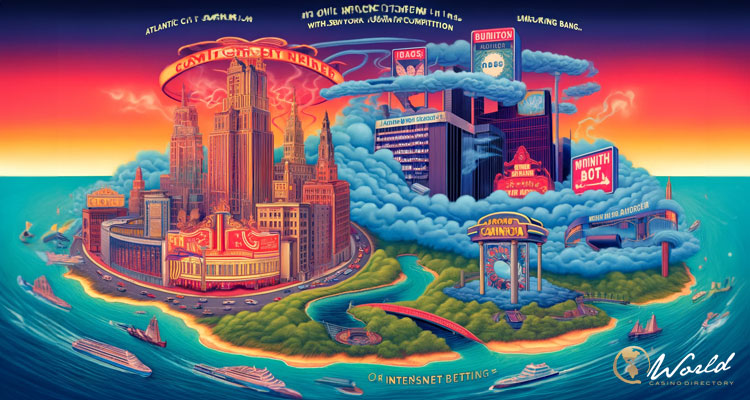Casinos in the Northeast U.S. are currently facing a large number of problems as they prepare for the emergence of fresh rivals in NY City. Among those problems are the loss of business from illegal online operations, the ongoing debate over whether internet gambling hurts or helps the bottom line of physical casinos, and a potential smoking ban in Atlantic City. Additionally, these problems were recognized at a major casino conference held in Atlantic City on April 17th.
The impact of competitors from New York on the business flow of Atlantic casinos:
At the aforementioned casino conference, dubbed the East Coast Gaming Congress, held at the Hard Rock casino, panelists spoke of turbulence in the industry, especially as it’s in the middle of preparation for an inflow of 3 casinos from downstate NY that are projected to reshape the gambling market in the region.
As for New York, it is currently preparing to answer hundreds of questions from possible casino operators, and is in the process of selecting casino locations, prior to even thinking about rewarding available licenses.
Relatedly, the president of the Casino Association of New Jersey and Atlantic City’s Resorts casino, Mark Giannantonio, commented that Atlantic City has 2 years to get ready for fresh rivals that will come from NY.
In this regard, he said, projecting a stronger rivalry for clients from different states and from the region who will select to gamble and visit NY: “We see New York gaming in general clearly as a threat.” In addition, he added that NY casinos will also affect rivals from Connecticut and eastern Pennsylvania.
Atlantic City must improve to meet new challenges:
In order to be ready to face the new rivals, Atlantic City must take its public safety, infrastructure and cleanliness to a new level to face the challenges that the fresh rivals will bring.
Speaking on the subject, Giannantonio commented: “Casinos can only do so much. We provide the jobs, the capital. Let’s match the streets with the beautiful aspects of the ocean. Let’s take care of our homeless population once and for all. There needs to be an investment and programs that will take a homeless person from the streets or under the Boardwalk and get them the help they need.”
Furthermore, Marty Small, the mayor of Atlantic City, didn’t instantly provided a response when asked to provide a comment on the afternoon of April 17.
The president of the New York Gaming Association, Stacey Rowland, commented that the future fresh casinos in NY want to grab the gambling money that other state currently have access to. On that note, she commented: “Competition is a good thing. The competition from New York City will be a motivation (for rivals) to step up.”
Atlantic City casino employees want to end smoking on the gambling floors:
In addition to the aforementioned problem, Atlantic City is also currently under pressure from casino employees who want to ban smoking on the floors reserved for gambling. Additionally, they have called on lawmakers to enact smoke-free legislation and recently submitted legal action to cancel a New Jersey law that frees casinos from Atlantic City from the state’s indoor clean air law.
On that note, Giannantonio commented that the smoking prohibition is “one of the greatest threats to our business right now.” He also projected it would cause millions in lost state tax income and the loss of about 2,500 casino jobs.
He backs up a compromise proposal. The compromise proposal represents a permit for smoking at a distance from table games and in rooms where no worker would have to work. Nonetheless, casino employees dismissed those assertions and commented that casinos would be better off financially by luring in non-smokers who currently shun them.
Speaking on the subject, Borgata dealer and leader of the employee smoke-free movement, Lamont White, said, according to the Associated Press: “Casino executives keep making the same discredited claims and are promoting a false compromise that will only continue to force us, their own employees, to breathe toxic air at our jobs every day. They don’t give a damn about the cancer and heart disease and stroke and COPD and countless other diseases that result from this unacceptable work environment that every other New Jersey worker doesn’t have to face.”
Discussions about online gambling:
Several states are once again considering internet gambling as a way for them to generate fresh income. Additionally, it is currently legalized in Rhode Island, Connecticut, Michigan, Pennsylvania, West Virginia, Delaware and New Jersey.
Online gambling has proven to be a boon to the brick-and-mortar casinos of Atlantic City, according to Giannantonio. For example, Resorts has a popular online division connected with the DraftKings bookmaker.
However, there are those who disagree, such as the president of Cordish Gaming Group and the Live! casinos, involving establishments in Florida, Pennsylvania and Maryland, Rob Norton. He commented that online casino gambling is having a negative impact on physical casinos, saying: “It is cannibalizing.” Also, commenting on the industry as a whole, he added: “The approach we’re taking right now is pitting ourselves against ourselves.”
But his opinion is isolated, as others in the industry have said that online gambling only supplements their physical casino operations.
Speaking about it, Giannantonio said: “For New Jersey, it has been additive.” Resorts has managed to triumphantly integrate its client loyalty program over the online and physical sectors.
He added that online sports wagering was a “funnel for i-gaming” and physical players. “We get a lot of people who bet sports online who come into our physical location to place a bet.”
Furthermore, every panelist also cited the land-based, unlicensed, and unregulated slot machines and non-legal offshore gambling sites as additional threats to the industry.



